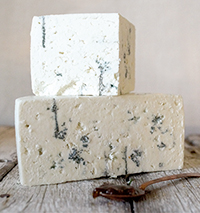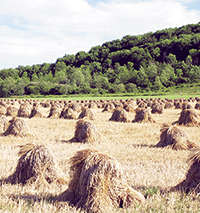 |
|||

|
 |

|
|

January 13, 2023 |
||||||
| ‘Simply Sustainable’ reflects culture of Kingston Amish farming tradition | ||||||
By Rena Archwamety CAMBRIA, Wis. — Kingston Creamery this month is introducing its handcrafted Amish Blue cheeses to retail with the new tagline, “Simply Sustainable.” For the creamery, which is owned and operated by the Kingston Amish community, this phrase represents a tradition of farming grounded in care for the environment. “We believe as dairy farmers that, collectively, all of us are called to utilize these given resources and leave them in a better place than we found them,” says Nelson Schrock, general manger, Kingston Creamery. • Rich soil, healthy cows Kingston Creamery sources its milk from the community’s 85 farms, with about 14-15 cows per farm. The 1,200 total cows are spread over a 50-mile radius, ensuring the animals ample space to graze and gentle use of the land. Field work is all done with horses, and minimal synthetic fertilizers are used for crops. “When we think about soil, every dairy farm has animal waste that it utilizes and reincorporates back into soil as plant food. But we have to make that animal waste be earthworm-friendly. The earthworm does the nutrient-rich exchange to make the soil ready for plant life,” Schrock explains. “As Amish dairy farmers, we incorporate wheat, oat or corn stubble — organic matter — back into the manure waste, which makes it a compostable product, which then makes it be soil-ready and earthworm-friendly.” As the animal waste is used to produce rich soil, the soil also is used to grow forages for the animals. Schrock notes Amish farmers believe animals “are what they eat.” Grazing is prominent in the warmer months, and in the winter, the cows are fed corn silage, dry hay and a soybean supplement for protein. This diet helps the cows produce high-quality milk that in turn creates flavorful cheese. • Clean water and air Related to the Kingston Amish land management practices is proper water usage and attention to runoff. “We’re building soil. We believe that the farm fields should be covered with grazing material. When we get drenches of rain, a typical Amish farmer’s field will not be as susceptible to have erosion because of the nutrient-rich condition of the soil, and this creates less runoff concerns,” Schrock says. Additionally, due to the small herd sizes and less animal concentration, Schrock notes, air pollution also remains at a minimum. “When you talk about air quality, you can drive by 100 Amish farms and not even know you’ve driven by a farm,” he says. “We have the right amount of animals spread out among the right amount of acres.” Cows are milked by hand, and the milk is picked up right away by a contracted service provider, limiting the use of energy and fossil fuels used for cooling, automation and machinery. Cheesemaking and other practices at the plant are all done by hand as well. “For us, rather than invest in automation or having a high degree of technology, we believe in working by the sweat of our brow and doing things by hand to truly maintain the human touch,” Schrock says. “Milk handling, cheesemaking and all practices are done by hand by Amish community workers.” Kingston Creamery also has been researching sustainability options for all of its food packaging, such as moving from 100% virgin materials to FDA-approved packaging that contains recycled content. “Sustainability” is a trending word in the food and dairy industry with more and more companies adopting sustainable practices and calling it out on their packaging. However, the practice of sustainably managing the land, animals and food has been integral to the Amish way of life for generations. “This is the technique that has been handed down through generations — how we treat the resources given to us, how we approach them, and how we leave them from generation to generation,” Schrock says. “That’s how our claim ‘Simply Sustainable’ was born, by studying the actual beginning of the food chain through this lens.” The Kingston Amish community in South Central Wisconsin has been handcrafting cheese for 40 years, and until now has focused primarily on private-label business. The Kingston Creamery brand first was introduced in 2019, followed by expanded product offerings. Goat Milk Blue Cheese and Organic Blue Cheese debuted in mid-2021. To obtain the USDA Organic label, Schrock notes that Kingston simply had to certify its farms without having to change the farms’ practices, which already were in-line with organic requirements. Recently, Kingston Creamery added a fourth vat to help increase its production capacity and allow it to create smaller batches of handcrafted artisan cheese. Its latest cheese to come from this expansion is the mixed-milk “Breezy Blue,” which launches this month in retail outlets and is available in both retail packaging and cut-and-wrap formats. “We have been pleased with a modest 10% growth factor, as we believe growing too fast, too quickly, can be challenging,” Schrock says. “We expect to maintain that rate of growth.” In addition to the new Breezy Blue and recently introduced Specialty Goat and Organic Blue cheeses, Kingston Creamery also offers Smoked Blue Cheese, Premium Blue Cheese and Gorgonzola. Kingston Creamery will be featuring its complete lineup of handcrafted Blue cheeses next week at the Fancy Food Show in Las Vegas at booth #817 with the help of its sales and marketing agency Presenture LLC. Dairy Farmers of Wisconsin also has provided “meet and greet” opportunities, bringing retailers and other potential buyers into the Kingston Creamery facility to tour and meet plant managers and representatives of its cooperative. When telling the “Simply Sustainable” story, Schrock notes that Kingston’s methods of farming and cheesemaking are unique to the Amish community’s small farm sizes and communal structure, a one-off that would be difficult to replicate in other operations. However, the concept of preserving resources can be universal. “Our Amish farmers believe our resources are given to us — the land, the soil, the air, the water and the animals on the farm — and we have to leave them in a better place than when we found them,” he says. “That’s the very heart of the matter.” CMN |
||||||
| CMN article search |
|
|
© 2024 Cheese Market News • Quarne Publishing, LLC • Legal Information • Online Privacy Policy • Terms and Conditions
Cheese Market News • Business/Advertising Office: P.O. Box 628254 • Middleton, WI 53562 • 608/831-6002
Cheese Market News • Editorial Office: 5315 Wall Street, Suite 100 • Madison, WI 53718 • 608/288-9090

